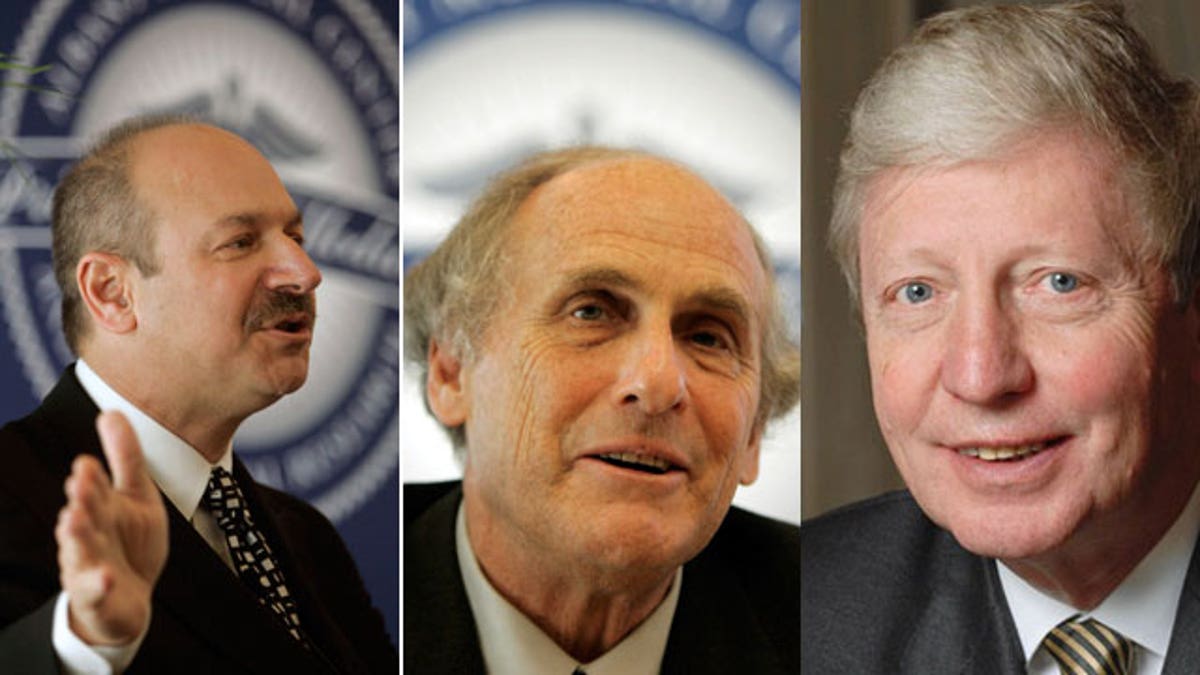
Pictured from left to right: Dr. Bruce Buetle, Dr. Ralph Steinman and Dr. Jules Hoffman. Steinman (center) passed away from cancer mere days before his research into the disease earned science's top medal. (AP/Nobelprize.org)
STOCKHOLM – A pioneering scientist awarded the Nobel Prize for medicine Monday will receive the top science award -- despite the revelation that he had died a few days before the announcement.
The Nobel prize committee is only supposed to give its top prize to living scientists. Yet the committee was unaware of the Friday afternoon death of Ralph Steinman when it awarded the scientist a 10 million kronor ($1.5 million) prize Monday morning -- raising the distasteful potential that he could be posthumously stripped of the award.
The Nobel Foundation said Monday afternoon that Steinman's award would stand, the Associated Press reported -- even though giving it to him is a technical violation of the rules.
"The Nobel Prize to Ralph Steinman was made in good faith, based on the assumption that the Nobel laureate was alive," the committee said in a statement.
Steinman won the Nobel for his work on the immune system. Mere hours later, Rockefeller University in New York, where he had studied and worked since 1970, revealed that he had died at age 68 of pancreatic cancer -- despite using the cutting-edge research he had developed to prolong his own life.
"I think you can safely say that this hasn't happened before," Nobel Foundation spokeswoman Annika Pontikis told The Associated Press.
The Nobel statutes say work "by a person since deceased shall not be considered for an award" but they don't specifically say whether that also applies if the jury mistakenly picks a winner unaware that he or she has died.
"It is with deep sadness and regret that the Nobel Assembly at Karolinska Institutet has learned that Professor Ralph Steinman, one of this year's three Nobel Laureates in Physiology or Medicine, passed away on September 30," the committee said in a statement.
Steinman shared the prize with American Bruce Beutler and French scientist Jules Hoffmann.
Beutler and Hoffmann were cited for their discoveries in the 1990s of receptor proteins that can recognize bacteria and other microorganisms as they enter the body, and activate the first line of defense in the immune system, known as innate immunity.
Their work could help efforts to make the immune system fight cancerous tumors, the committee said. No vaccines are on the market yet, but Nobel committee member Goran Hansson told The Associated Press that vaccines against hepatitis are in the pipeline.
"I am very touched. I'm thinking of all the people who worked with me, who gave everything," Hoffmann said by telephone to a news conference in Paris. "I wasn't sure this domain merited a Nobel."
Beutler said he woke up in the middle of the night, glanced at his cellphone and realized he had a new email message.
"And, I squinted at it and I saw that the title line was 'Nobel Prize,' so I thought I should give close attention to that," Beutler said in an interview posted on the Nobel website. "And I opened it and it was from Goran Hansson, and it said that I had won the Nobel Prize, and so I was thrilled."
Still, he was a "little disbelieving" until he checked his laptop, "and in a few minutes I saw my name there and so I knew it was real."
Before the statutes were changed in 1974 two Nobel Prizes were given posthumously. In 1961, U.N. Secretary-General Dag Hammarskjold was awarded the Nobel Peace Prize less than a month after he died in a plane crash during a peace mission to Congo. Swedish poet Erik Axel Karlfeldt won the Nobel in literature in 1931, although he had died in March of that year.
Beutler, 53, holds dual appointments at University of Texas Southwestern Medical Center in Dallas and as professor of genetics and immunology at the Scripps Research Institute in San Diego. He will become a full-time faculty member at UT Southwestern on Dec. 1.
Hoffmann, 70, headed a research laboratory in Strasbourg, France, between 1974 and 2009 and served as president of the French National Academy of Sciences between 2007-08.
Steinman had been head of Rockefeller University's Center for Immunology and Immune Diseases.
"We are all so touched that our father's many years of hard work are being recognized with a Nobel Prize," Steinman's daughter, Alexis Steinman, said in the Rockefeller University statement. "He devoted his life to his work and his family, and he would be truly honored."
Hoffmann's discovery came in 1996 during research on how fruit flies fight infections. Two years later, Beutler's research on mice showed that fruit flies and mammals activate innate immunity in similar ways when attacked by germs.
Steinman's discovery dates back to 1973, when he found a new cell type, the dendritic cell, which has a unique capacity to activate T-cells. Those cells have a key role in adaptive immunity, when antibodies and killer cells fight infections. They also develop a memory that helps the immune system mobilize its defenses next time it comes under a similar attack.
The Associated Press contributed to this report.
